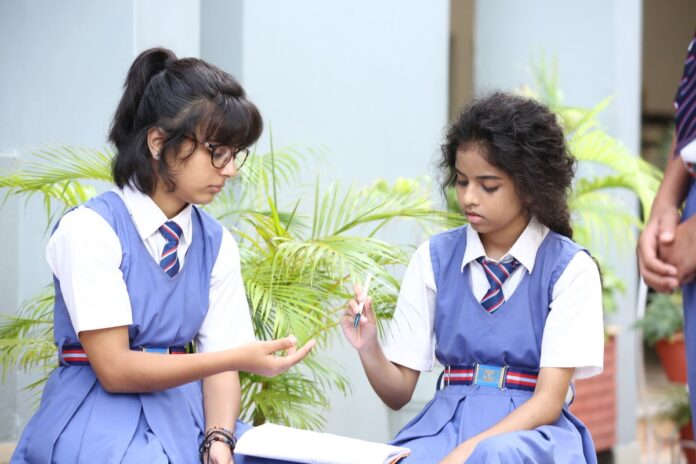Indian cinema’s portrayal of women often veers between two extremes: sari-clad maternal figures or vodka-sipping partygoers, with filmmakers struggling to strike a balance and give a rather realistic portrait. Prime Video’s latest original, Sharmajee Ki Beti, attempts to do so through the story of five women, all carrying the same titular surname, across three generations.
Tahira Kashyap Khurrana’s protagonists have been picked from everyday life: the people you’ve met, the friends you’ve had, or perhaps even the person you’ve been. You’ll see the teens fretting about puberty and the adults dealing with loneliness, patriarchal expectations and strained interpersonal relationships. All the Sharma women have battles of their own. The film keeps oscillating between the storylines, with the characters occasionally popping up in each other’s verses, like crossover episodes.
Thoughtful portrayal of womanhood

Sakshi Tanwar has essayed her role as a working mother impressively
The writing is thoughtful and attuned to the smallest of emotions, the quietest of moments, and the unspoken tensions that simmer beneath the surface. There is a scene in which a teenager (Vanshika Taparia) lashes out at her working mother (Sakshi Tanwar): “Why should dad help me in getting ready; it’s your job”. This small yet powerful scene exposes how deeply entrenched gender roles affect the often-ignored parent-child dynamic.
The film also sheds light on how men often perpetuate hidden patriarchal standards unknowingly. While they might be loving and caring, they still fall prey to the version of a perfect woman they have been fed over the years. Yes, they might help with household chores but unknowingly view it as a favour, or acknowledge their partner in public but fail to recognise their dreams or ambitions.
You’ll find plenty of such important conversations in the movie, that peel back the veneer of hypocrisy from the convenient version of woman empowerment that society offers: you get the “chance” to be a sportsperson, but should have your mascara perfect; you can go to your job, but god forsake you if you forget a house chore; you can have a kitty party to battle your melancholic loneliness, but of course, you are then a “velli” (someone with a lot of leisurely time on their hands).
Cliches and convenient stereotypes

Saiyami plays a state-level cricketer whose boyfriend keeps nudging her to be more feminine
While the overall tone isn’t preachy, it erupts in parts. The film tends to lean on tired cliches from time to time. There are moments where one can feel the makers’ panic to include it all, ticking off an imaginary checklist of themes, even if it only adds to the clutter — the same mistake that Sanjay Leela Bhansali made with Heeramandi.
This especially stands true for Saiyami Kher’s character as a state-level cricket player, who hates getting ready. While I get that it can be a person’s personal choice, the portrayal felt too convenient and stereotypical. For a film that aims to celebrate womanhood, the need to masculinise the sportswoman, rather than embrace her unique feminine qualities is rather disappointing. Kher’s one-dimensional performance doesn’t help either. I wish it were a more grey and complex characterization instead of the black-and-white approach taken.
Another area where the film struggles slightly is coherence. When you are fully invested in one of the Sharmas, the other one takes over, fragmenting the narrative flow. An anthology format where each story was presented as a standalone segment, might have worked better, in my opinion. This would have allowed the audience to fully immerse themselves in each narrative and consider each story with the weight it deserves.
However, despite its flaws, Sharmajee Ki Beti deserves attention for its beautiful attempt to shed light on the various challenges of womanhood and spark essential conversations. The heartfelt messages and authentic representation make it a good cinematic piece for introspection. I particularly liked how it captures the smallest, often most mundane aspects of womanhood, and their profound impact on women’s lives, in all its storylines.
There is a scene in which we see an elderly woman (Sunita Malhotra) unapologetically enjoying an erotic audiobook or podcast. The brief scene is remarkably candid and dares to bring forth the often-hushed taboo topic of sexuality among the elderly to the spotlight. It breaks down ageist barriers and encourages a more inclusive conversation about sexuality.
Performances shine in Sharmajee Ki Beti

Divya Dutta’s story arc is the most touching of them all
The film shone in a few other parts, as well. Divya Dutta’s character, for instance, is exquisitely crafted, and elevated by a flawless performance. Dutta plays a lonely housewife who moves from Patiala to Mumbai, only to meet a new bleak reality. Her husband (Parvin Dabas) is now indifferent, her teenage daughter (Arista Mehta) prefers solitude, and her mother, back in her hometown, isn’t too keen on engaging with her.
This leaves Dutta’s character with an empty void. You’ll see her trying to strike up a conversation with every human she sees, including vendors and small kids, all of whom brush her off. The pain of her character resonates deeply, and one can’t help but feel sorry for her. The film captures urban loneliness, seen increasingly pervasive in metro cities today, with the care and sensitivity it deserves.
Dutta’s character would also often travel to the land of her imagination, where she is loved, celebrated, taken care of, or even be considered a superhero at times! Each of these daydream sequences adds a playful touch, breaks the tension, and balances the film’s tone.
A surprising highlight is the performance from child actor Vanshika Taparia, who plays Sakshi Tanwar’s teenage daughter. She rants, yells, overthinks, and is often self-absorbed and insecure. Taparia’s performance is compelling and true to life. I look forward to seeing more of her work in the future.
Sharmajee Ki Beti is now available to stream on Prime Video



